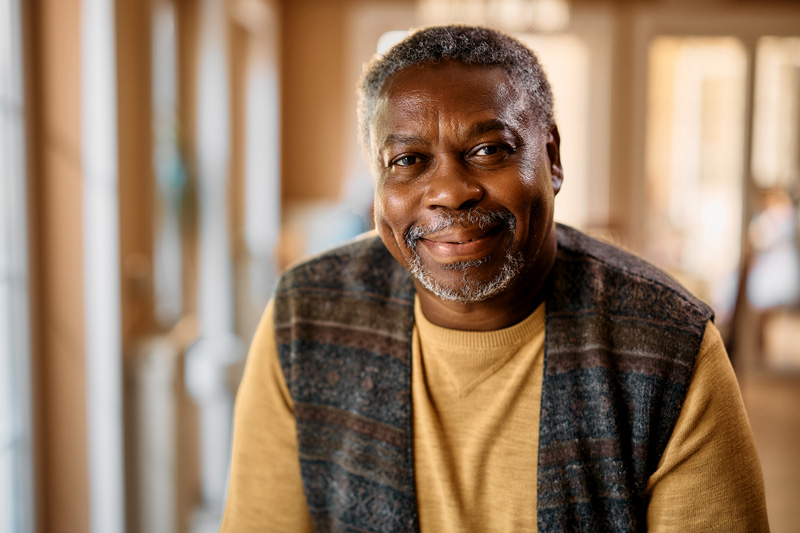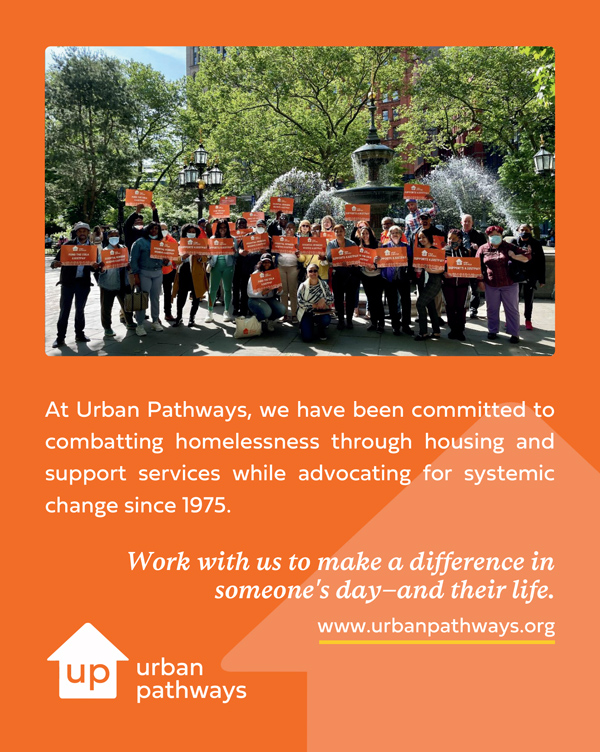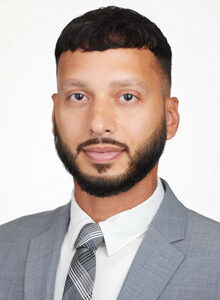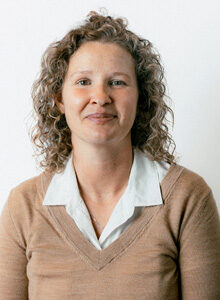Founded in 1975, Urban Pathways has long been a beacon of hope for those in need of supportive housing and comprehensive care. Today, under the leadership of CEO Frederick Shack, Urban Pathways serves over 3,900 people across a variety of 20+ services and programs in NYC. UP operates outreach teams, drop-in centers, safe havens, apartment treatment, supported housing, affordable apartments, and specialized programs to address employment and health needs.

As many nonprofit agencies have noticed over recent years, the number of people aging in place has significantly increased despite care models remaining the same. In the past year alone, UP has served 1088 unique individuals who are 55 years of age or older. People’s lives have become more complex (comorbidities, impact of the pandemic, increased needs), while staffing patterns and funding have become a bit antiquated. This has led to a more assertive, creative approach by agencies like UP to address a growing need, especially among older adults.
In 2015, the Total Wellness Program was created in response to an increase in medically related 911 calls and ER visits. It emphasizes holistic care, addressing the physical, mental, emotional, and spiritual needs of the people being served. This program is particularly vital for the growing population of older adults within their supportive housing community. It began with one program and now collaborates closely with about ten programs, including safe havens, permanent Supported Housing, NYCHA apartments, and affordable housing. In 2023, 417 people were served by this initiative. Of those, 65% were 51 years of age and older. Folks benefiting from the Total Wellness Program often carry multiple diagnoses, with at least 50% struggling with three or more chronic diagnoses. Diagnoses include endocrine, nutritional, metabolic, and circulatory diagnoses, infectious diseases, cancer, and substance use disorders. The approach of the program is aligned with New York’s triple aim, which is to improve care, improve health, and reduce costs.
The Total Wellness Program consists of a Medical Director, Project Coordinator, Wellness Social Worker, Peer Specialist, Case Managers, Licensed Practical Nurses, and Medical Assistants. All other Urban Pathways staff receive relevant training and consultations from the TWP. Consultation sessions, facilitated by Dr. Sidor, take place every Thursday from 3-5 pm.
Romi Avin, the Program Director at Ivan Shapiro House, has been a pivotal figure in recognizing and addressing the needs of the aging population within supportive housing. Observing a significant increase in older adults, Romi spearheaded efforts to integrate a specialized focus on geriatric care within the Total Wellness Program. This initiative aims to ensure that every person receives comprehensive care tailored to their unique needs, promoting healthy aging and enhancing quality of life.
Each program site maintains a community partnership with a Federally Qualified Health Center that provides primary and specialty care in their respective community. The Total Wellness Project Coordinator, Anne Handford, Program Nurses, and Case Managers work to connect all residents to physical and mental health care, with linkages to specialty care and substance use services as needed. Program Nurses and the Project Coordinator provide group and one-on-one health education and work to increase residents’ knowledge of how their lifestyle and health behaviors impact both risk factors and protective factors for chronic and infectious diseases. All staff members aim to support people in building self-efficacy for appointment and medication adherence and to promote a culture of health and wellness.
Health education workshops and wellness events are held at 6 of our sites a year. Topics range from hypertension, diabetes, self-esteem, intimacy, sexual health, employment, healthy aging brains, and budgeting. These workshops help to address all aspects of one’s overall total health. It’s an approach Urban Pathways takes to help expedite a person’s recovery so they can achieve and sustain their life goals and age in place.
As we delve into the stories of several folks, we see the profound impact of this program and the dedicated work of one of our Program Directors, Romi Avin, LMSW, and the Total Wellness Program Coordinator, Anne Handford, MPH.
The Challenge of Aging and Alcohol Use Disorder
A 66-year-old man is facing significant hurdles due to his alcohol use. Despite his desire to transition into assisted living, his use has led to repeated denials. Romi and Anne have been instrumental in providing comprehensive support, helping him navigate the complex web of healthcare, social services, and personal recovery. Through motivational interviewing and consistent medical accompaniment, the program aims to foster a healthier relationship with alcohol and support him in reaching his goal of moving into assisted living. The teamwork goes beyond traditional case management.
Addressing Hoarding Behaviors in Social Isolation
The pandemic-induced social isolation has led to unintended consequences for many, including a person in her 60s who developed hoarding behaviors. This behavior has caused challenges in apartment upkeep and has exacerbated her mental health conditions. The program is providing targeted interventions that address the root causes of her hoarding behavior. By fostering social connections and offering mental health support, the program aims to improve her living conditions and overall well-being (BMC Public Health). Safeguards are also being put in place to support this person better as they reduce their hoarding. Opportunities for socialization are explored and normalized through community resources (spiritual centers, places of special interest, etc.), social media, and gatherings/events facilitated by the TWP and dedicated program site operations and social service staff.
The Invisible Struggle with Dementia
A 67-year-old man presents a poignant example of the challenges faced by older adults in supportive housing. He appears much older than his age, often wanders, and struggles with memory issues, likely exacerbated by undiagnosed dementia. The team is stepping in to provide the necessary support for dementia care, ensuring he receives the medical attention and social support required to manage his condition. This also includes providing different options for him, such as life alerts, home attendant services, visiting nurses, appliances that reduce risks of fire, a reliable and consistent check-in system, and so on.
The Road Ahead
The need for comprehensive, age-specific care in supportive housing is backed by compelling statistics. According to the National Institute on Drug Abuse, older adults are at increased risk of substance use disorders, and the pandemic has only heightened these vulnerabilities. Programs like Total Wellness are vital in bridging the gap, offering a lifeline to those in need (SAMHSA).
Urban Pathways is making significant strides in transforming the lives of its older adults. By addressing the multifaceted needs of each individual, our Total Wellness Program not only improves health outcomes but also fosters a sense of community and support. As we continue to navigate the complexities of providing care in a post-pandemic world, the stories of resilience and recovery at Urban Pathways serve as a testament to the power of holistic, compassionate care. As we continue to expand and refine our Total Wellness Program, we owe immense gratitude to the generous funders who make this work possible. The Altman Foundation, the Robin Hood Foundation, and the Mother Cabrini Health Foundation have been instrumental in supporting our mission to provide holistic care to our folks, especially those aging in place. Their contributions enable us to address the myriad needs of people in our care, ensuring they receive comprehensive physical, mental, emotional, and spiritual support.
Romi Avin, LMSW, MS, HS-BCP, is Program Director of Housing; Jose Cotto, LCSW, is Chief Program Officer; Anne Handford, MPH CHES is Project Coordinator of the Total Wellness Program; and Mardoche Sidor, MD, is Medical Director at Urban Pathways.
References
Schofield, J., Dumbrell, J., Matheson, C., Parkes, T., & Bancroft, A. (2022). The impact of COVID-19 on access to harm reduction, substance use treatment and recovery services in Scotland: A qualitative study. BMC Public Health, 22(500). doi.org/10.1186/s12889-022-12722-5
Substance Abuse and Mental Health Services Administration (SAMHSA). (n.d.). Retrieved from samhsa.gov








